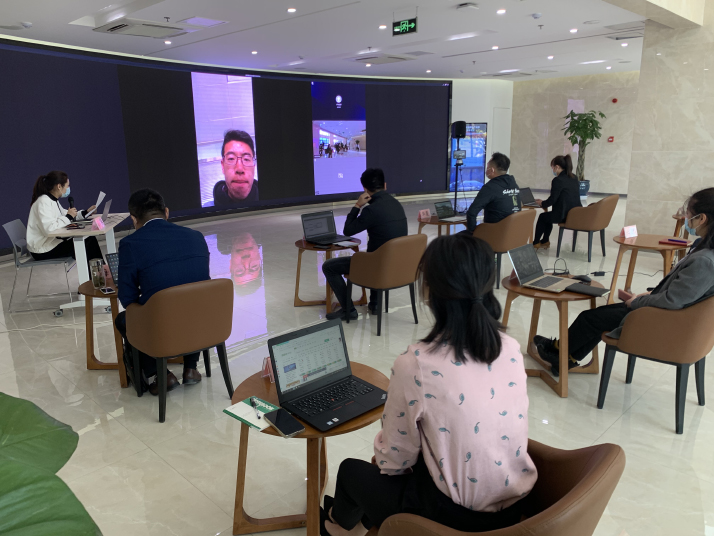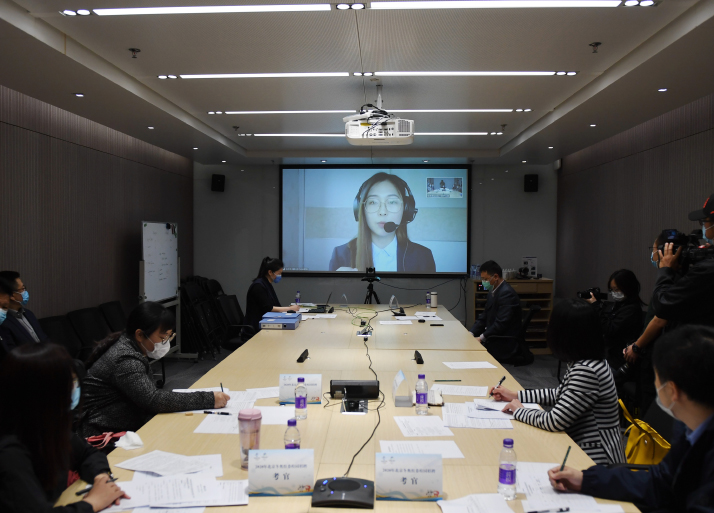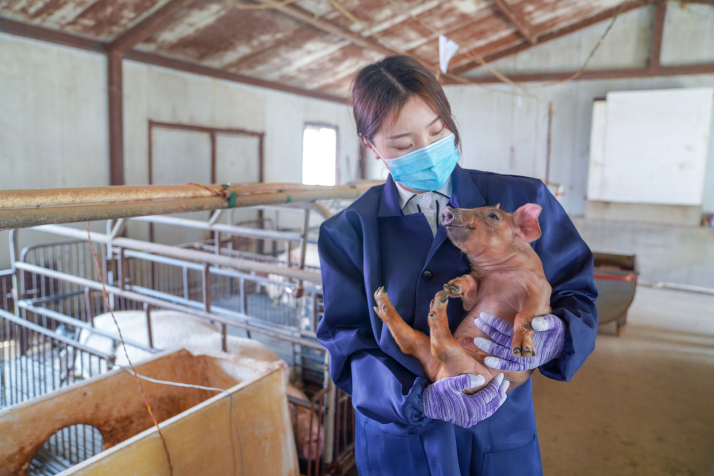| Editor's Choice |
| Government and institutions devise ways to ensure employment for nearly 8.74 million new graduates | |
|
|
 Wu Wenting, a senior student in Shanghai Normal University, shows an online recruitment platform on her cellphone on March 12. The platform was launched in Shanghai for graduate students (XINHUA)
Xu Nan, a former intern at a tourism company in Shanghai, is rethinking her career plan. The graduating business management student had been interning with a tourism company and expecting to be hired there before the novel coronavirus epidemic struck. Since tourism, catering and hospitality industries were hit hard, Xu wants to hedge her bet in case her company doesn't need her.
She painstakingly applied to nearly 30 companies in the first quarter of the year but was called to only a few interviews as the epidemic continued. The few interviews she did were conducted mostly via telephone or video links, which is becoming the new normal. Xu is trying to adjust to the new reality though she said phone interviews make her especially nervous for she couldn't see her interviewers and gauge their reaction to her answers. Like Xu, many fresh college graduates are finding it hard to land a job though the epidemic has been controlled in China and industries are resuming operation. Zhang Chenggang, a job market researcher at the Capital University of Economics and Business in Beijing, told financial news agency Yicai that research in March showed that the graduating students would face a bleaker job market compared with last year. However, that is not yet the definitive scenario since recruitments are still going on and the final results will be known only in July.  An online interview held in Xuzhou City of Jiangsu Province on April 15 (XINHUA)
Online recruitment
According to statistics from the Ministry of Education (MOE), 8.74 million college students will graduate this year, 400,000 more than last year, hitting a historical high. However, the demand for labor shrinks as the epidemic causes financial difficulties for small and medium-sized enterprises (SMEs), which provide the bulk of jobs, delays investment and projects, and curbs domestic and international business activities. According to a survey of 99,000 employers across China by China Higher Education Student Information and Career Center, an agency under the MOE, 16 percent of the employers said they have canceled their spring recruitment plan. Of the rest, 65.6 percent said they would be hiring fewer people. "I expected to find a job this spring but now I have to lower my expectations," a graduate majoring in finance at Peking University surnamed Huang told People's Daily, adding that many financial companies have cut their recruitment quota owing to the epidemic. According to a joint report released by the China Institute for Employment Research at Renmin University of China and major online recruitment platform Zhaopin.com on April 22, over 60 percent of college graduates surveyed said the epidemic had negatively impacted their job hunting. Over 70 percent of those who received offers had not signed contracts with the employers yet. Bai Lu, a senior student at Taiyuan University of Technology in Shanxi Province in north China, has been browsing recruitment websites to send his applications. All the interviews he has attended so far have been conducted online. Although he was confined in his home city Linfen during the epidemic, Bai said he never stopped job hunting. During the epidemic he sent his resume to 10 potential employers and received several offers. "Looking for jobs online is very convenient and efficient," he told Xinhua News Agency. On February 28, an agency under the MOE named New Career Service Site for Students collaborated with five recruitment websites including 51job.com and Zhaopin.com to launch an online recruitment platform for college graduates. The platform runs 24 hours a day, 365 days a year. By April 3, it had received over 11 million applications. Universities across China are also promoting online recruitment and consultation to help graduates find jobs. In Beijing, nearly 100 online job fairs have been held, with over 150 employers participating in each. They have provided over 1 million jobs to new graduates. Liu Xinjun, an official with the Beijing Municipal Education Commission, told People's Daily that although the job market prospect is grim this year, recruitment of graduating students from universities in Beijing has not been seriously disrupted. Also, a greater number of employers are participating in online recruitment activities, giving students more choices. On March 20, Zhejiang University in east China held an online recruitment fair for its graduating students. Over 600 enterprises took part in the event, providing 2,000 vacancies. Mao Ruiming, a graduate of the School of Mechanical Engineering at the university, logged on early in the morning that day to look at the jobs on offer. He sent his resumes to prospective employers on the university's platform and consulted the employers' human resources staff about the jobs. Gao Wei, deputy manager of the human resources department of China Construction Eighth Engineering Division Corp., a state-owned enterprise (SOE), was impressed with the online consultation function. He told People's Daily that he received over 120 resumes and communicated with the students online. Next they would organize one-on-one video interviews. To make online recruitment more efficient, the universities are also coming up with innovative measures. Peking University invites SOEs such as China Electronics Technology Group Corp. to give career talks to students online. Beijing Foreign Studies University conducted online lectures on job hunting and counseling to answer students' questions regarding career planning. Beijing University of Technology has launched a resume "diagnosis" service, where career planning experts evaluate and improve graduates' resumes. However, although online recruitment has reduced companies' recruitment costs and expanded options for both employers and employees, it has its limitations. Downloading the resumes, printing them out and filing them are time consuming. In addition, unable to meet job applicants in person, many companies require successful candidates to intern with them. "As the employers and employees don't know each other well, internship is necessary to gauge candidates' capabilities and decide whether they can be recruited," Liu said.  Beijing Organising Committee for the Beijing 2022 Olympic and Paralympic Winter Games holds an online interview on April 29 (XINHUA)
Government support
Multiple Central Government departments have rolled out various measures to help graduating students find jobs. The MOE has increased annual enrollment of graduate schools by 189,000 so that more undergraduates can opt for more advanced education, which will improve their qualifications and also, for the present time, ease the pressure on the job market. Graduating students from impoverished families are given additional help in finding jobs. For instance, China Agricultural University in Beijing has been recommending such graduates for jobs. In a notice issued on March 12, the State-owned Assets Supervision and Administration Commission asked centrally administered SOEs to create more jobs to stabilize the employment market. The SOEs were told to ensure that they recruit the same number of college graduates this year as last year, if not more. In response, China Petrochemical Corp., China's largest oil refiner, added 3,500 jobs to its recruitment plan. It will recruit over 10,000 people this year, more than double the number in last year. China International Intellectech Co. Ltd., a central SOE providing human resources services, will hold a special recruitment event for Hubei, the province in central China where the epidemic was the most severe. Special help will be given to job-seeking adult children of medical workers, soldiers and other people who have fought the epidemic on the frontline. China Three Gorges Corp., the SOE that built and operates the world's biggest hydroelectric power project, the Three Gorges Dam, in Yichang, a city in Hubei, reserved 200 posts for graduates from universities in Hubei and gave preference to medical workers' children in its recruitment this year. On April 8, the MOE launched a program where 48 universities across China are offering counterpart assistance to universities in Hubei till September to assist Hubei graduates land jobs. Peking University is pairing up with Wuhan University, and Tsinghua University is assisting Huazhong University of Science and Technology. The universities will share their online recruitment platforms and jointly hold online recruitment activities. They will provide more targeted recruitment information for graduates, using big data to match students and employers. Jin Zijing, a graduating student majoring in safe engineering at the China University of Mining and Technology, Hubei, sent his first job application to a company that he is especially proud of, the state-owned China Construction Third Engineering Bureau Co. Ltd. This Hubei-headquartered company built the specialty Leishenshan and Huoshenshan hospitals in Wuhan in about 10 days to treat novel coronavirus patients during the peak epidemic period, a feat that won worldwide admiration. To Jin's delight, the company offered him the job. Wu Jiang, Vice Chairman of the China Society of Administrative Reform, a non-profit organization, told Yicai that government departments, SOEs and public organizations should create more jobs as market confidence has waned owing to the epidemic and many fresh graduates were floundering to find jobs. However, Zhang from the Capital University of Economics and Business said that such policies were temporary.  A college graduate checks a piglet in a village in Shulan, a city in Jilin Province in northeast China, on April 27 (XINHUA)
Growth opportunities Although the epidemic dealt a blow to the job market, according to Weng Tiehui, Vice Minister of Education, the development of new growth drivers and transformation of old ones will create more jobs. "We will encourage graduates to work for major national projects and in key areas," she said at a press conference in February. She also encouraged graduating students to apply for grassroots-level posts such as village officials. Feng Lijuan, a senior expert on human resources at 51job.com, said the epidemic's impact on employment is not entirely negative. "Companies which are in fierce competition and profound transformation, such as those in the computer chip, training, retailing and pharmaceutical industries, deeply rely on young people with knowledge. Therefore new graduates still have many opportunities," she told Yicai. Graduating students are also looking for jobs with a changed mindset. According to a report published by job hunting platform Liepin on April 10, when asked to name the five factors they consider most important about their new job, college graduates valued "stability." It was the second most important factor for them, with the most important being income. In comparison, in 2019, stability had been the fifth most important factor for these job seekers. Duan Shiyi, a graduate student majoring in Japanese at the Beijing Language and Culture University, told Beijing Review that the epidemic has prompted her to reconsider her career plans. "I like animation and computer games and am an intern in a video games company. However, I have begun to rethink my career plan," she said. "Since I don't work in an essential technological post, I may lose my job if the company reshuffles its personnel in an emergency situation." Duan used to think that content and flexibility were the most important things in a job. Now she is thinking about working for the government or a public service organization, which will mean more stability. (Jin Zhixiao contributed to this article) (Print Edition Title: Getting the Job Done) Copyedited by Sudeshna Sarkar Comments to jijing@bjreview.com |
|
||||||||||||||||||||||||||||||
|